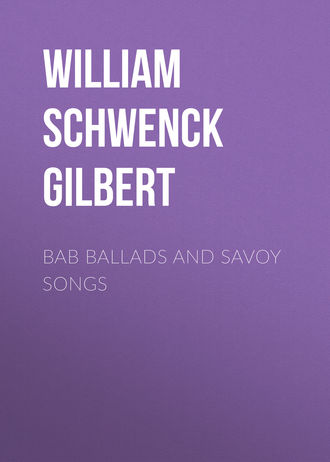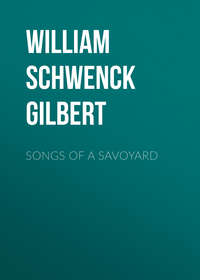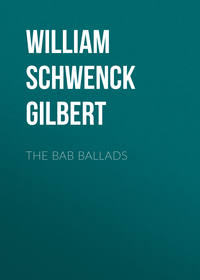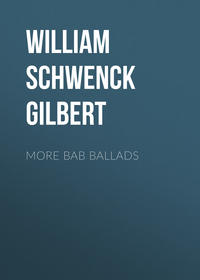Bab Ballads and Savoy Songs
 полная версия
полная версияBab Ballads and Savoy Songs
Жанр: юмористическая литературазарубежный юморзарубежная поэзиязарубежная классиказарубежная старинная литературастихи и поэзияюмор и сатирасерьезное чтениеcтихи, поэзия
Язык: Английский
Год издания: 2018
Добавлена:
Настройки чтения
Размер шрифта
Высота строк
Поля
SAID I TO MYSELF, SAID I
When I went to the Bar as a very young man,(Said I to myself—said I),I'll work on a new and original plan(Said I to myself—said I),I'll never assume that a rogue or a thiefIs a gentleman worthy implicit belief,Because his attorney has sent me a brief(Said I to myself—said I!).I'll never throw dust in a juryman's eyes(Said I to myself—said I),Or hoodwink a judge who is not over-wise(Said I to myself—said I),Or assume that the witnesses summoned in forceIn Exchequer, Queen's Bench, Common Pleas, or Divorce,Have perjured themselves as a matter of course(Said I to myself—said I).Ere I go into court I will read my brief through(Said I to myself—said I),And I'll never take work I'm unable to do(Said I to myself—said I).My learned profession I'll never disgraceBy taking a fee with a grin on my face,When I haven't been there to attend to the case(Said I to myself—said I!).In other professions in which men engage(Said I to myself—said I),The Army, the Navy, the Church, and the Stage(Said I to myself—said I),Professional license, if carried too far,Your chance of promotion will certainly marAnd I fancy the rule might apply to the Bar(Said I to myself—said I!).THE FAMILY FOOL
Oh! a private buffoon is a light-hearted loon,If you listen to popular rumor;From morning to night he's so joyous and bright,And he bubbles with wit and good-humor!He's so quaint and so terse, both in prose and in verse;Yet though people forgive his transgression,There are one or two rules that all Family FoolsMust observe, if they love their profession.There are one or two rulesHalf a dozen, maybe,That all family fools,Of whatever degree,Must observe, if they love their profession.If you wish to succeed as a jester, you'll needTo consider each person auricular:What is all right for B would quite scandalize C(For C is so very particular);And D may be dull, and E's very thick skullIs as empty of brains as a ladle;While F is F sharp, and will cry with a carp,That he's known your best joke from his cradle!When your humor they flout,You can't let yourself go;And it does put you outWhen a person says, "Oh!I have known that old joke from my cradle!"If your master is surly, from getting up early(And tempers are short in the morning),An inopportune joke is enough to provokeHim to give you, at once, a month's warningThen if you refrain, he is at you again,For he likes to get value for money.He'll ask then and there, with an insolent stare,If you know that you're paid to be funny?"It adds to the taskOf a merryman's place,When your principal asks,With a scowl on his face,If you know that you're paid to be funny?"Comes a Bishop, maybe, or a solemn D.D.—Oh, beware of his anger provoking!Better not pull his hair—don't stick pins in his chair;He don't understand practical joking.If the jests that you crack have an orthodox smack,You may get a bland smile from these sages;But should it, by chance, be imported from France,Half-a-crown is stopped out of your wages!It's a general rule,Though your zeal it may quench,If the Family FoolMakes a joke that's too French,Half-a-crown is stopped out of his wages!Though your head it may rack with a bilious attack,And your senses with toothache you're losing,Don't be mopy and flat—they don't fine you for that,If you're properly quaint and amusing!Though your wife ran away with a soldier that day,And took with her your trifle of money;Bless your heart, they don't mind—they're exceedingly kind—They don't blame you—as long as you're funny!It's a comfort to feelIf your partner should flit,Though you suffer a deal,They don't mind it a bit—They don't blame you—so long as you're funny!THE PHILOSOPHIC PILL
I've wisdom from the East and from the West,That's subject to no academic rule:You may find it in the jeering of a jest,Or distil it from the folly of a fool.I can teach you with a quip, if I've a mind!I can trick you into learning with a laugh;Oh, winnow all my folly, and you'll findA grain or two of truth among the chaff!I can set a braggart quailing with a quip,The upstart I can wither with a whim;He may wear a merry laugh upon his lip,But his laughter has an echo that is grim.When they're offered to the world in merry guise,Unpleasant truths are swallowed with a will—For he who'd make his fellow creatures wiseShould always gild the philosophic pill!THE CONTEMPLATIVE SENTRY
When all night long a chap remainsOn sentry-go, to chase monotonyHe exercises of his brains,That is, assuming that he's got any,Though never nurtured in the lapOf luxury, yet I admonish you,I am an intellectual chap,And think of things that would astonish you.I often think it's comicalHow Nature always does contriveThat every boy and every galThat's born into the world aliveIs either a little Liberal,Or else a little Conservative!Fal lal la!When in that house M.P.'s divide,If they've a brain and cerebellum, too.They're got to leave that brain outside.And vote just as their leaders tell 'em to.But then the prospect of a lotOf statesmen, all in close proximity.A-thinking for themselves, is whatNo man can face with equanimity.Then let's rejoice with loud Fal lalThat Nature wisely does contriveThat every boy and every galThat's born into the world alive,Is either a little Liberal,Or else a little Conservative!Fal lal la!SORRY HER LOT
Sorry her lot who loves too well,Heavy the heart that hopes but vainly,Had are the sighs that own the spellUttered by eyes that speak too plainly;Heavy the sorrow that bows the headWhen Love is alive and Hope is dead!Sad is the hour when sets the Sun—Dark is the night to Earth's poor daughtersWhen to the ark the wearied oneFlies from the empty waste of waters!Heavy the sorrow that bows the headWhen Love is alive and Hope is dead!THE JUDGE'S SONG
When I, good friends, was called to the Bar,I'd an appetite fresh and hearty,But I was, as many young barristers are,An impecunious party.I'd a swallow-tail coat of a beautiful blue—A brief which I bought of a booby—A couple of shirts and a collar or two,And a ring that looked like a ruby!In Westminster Hall I danced a dance,Like a semi-despondent fury;For I thought I should never hit on a chanceOf addressing a British Jury—But I soon got tired of third class journeys,And dinners of bread and water;So I fell in love with a rich attorney'sElderly, ugly daughter.The rich attorney, he wiped his eyes,And replied to my fond professions:"You shall reap the reward of your enterprise,At the Bailey and Middlesex Sessions.You'll soon get used to her looks," said he,"And a very nice girl you'll find her—She may very well pass for forty-threeIn the dusk, with a light behind her!"The rich attorney was as good as his word:The briefs came trooping gaily,And every day my voice was heardAt the Sessions or Ancient Bailey.All thieves who could my fees affordRelied on my orations,And many a burglar I've restoredTo his friends and his relations.At length I became as rich as the Gurneys—An incubus then I thought her,So I threw over that rich attorney'sElderly, ugly daughter.The rich attorney my character highTried vainly to disparage—And now, if you please, I'm ready to tryThis Breach of Promise of Marriage!TRUE DIFFIDENCE
My boy, you may take it from me,That of all the afflictions accurstWith which a man's saddledAnd hampered and addled,diffident nature's the worst.Though clever as clever can be—A Crichton of early romance—You must stir it and stump it,And blow your own trumpet,Or, trust me, you haven't a chance.Now take, for example, my case:I've a bright intellectual brain—In all London cityThere's no one so witty—I've thought so again and again.I've a highly intelligent face—My features cannot be denied—But, whatever I try, sir,I fail in—and why, sir?I'm modesty personified!As a poet, I'm tender and quaint—I've passion and fervor and grace—From Ovid and HoraceTo Swinburne and Morris,They all of them take a back place,Then I sing and I play and I paint;Though none are accomplished as I,To say so were treason:You ask me the reason?I'm diffident, modest and shy!THE HIGHLY RESPECTABLE GONDOLIER
I stole the Prince, and I brought him here,And left him, gaily prattlingWith a highly respectable Gondolier,Who promised the Royal babe to rear,And teach him the trade of a timoneerWith his own beloved bratling.Both of the babes were strong and stout,And, considering all things, clever.Of that there is no manner of doubt—No probable, possible shadow of doubt—No possible doubt whatever.Time sped, and when at the end of a yearI sought that infant cherished,That highly respectable GondolierWas lying a corpse on his humble bier—I dropped a Grand Inquisitor's tear—That Gondolier had perished.A taste for drink, combined with gout,Had doubled him up for ever.Of that there is no manner of doubt—No probable, possible shadow of doubt—No possible doubt whatever.But owing, I'm much disposed to fear,To his terrible taste for tippling,That highly respectable GondolierCould never declare with a mind sincereWhich of the two was his offspring dear,And which the Royal stripling!Which was which he could never make out,Despite his best endeavour.Of that there is no manner of doubt—No probable, possible shadow of doubt—No possible doubt whatever.The children followed his old career—(This statement can't be parried)Of a highly respectable Gondolier:Well, one of the two (who will soon be here)—But which of the two is not quite clear—Is the Royal Prince you married!Search in and out and round aboutAnd you'll discover neverA tale so free from every doubt—All probable, possible shadow of doubt—All possible doubt whatever!DON'T FORGET
Now, Marco dear,My wishes hear:While you're awayIt's understoodYou will be good,And not too gay.To every traceOf maiden graceYou will be blind,And will not glanceBy any chanceOn womankind!If you are wise,You'll shut your eyes'Till we arrive,And not addressA lady lessThan forty-five;You'll please to frownOn every gownThat you may see;And O, my pet,You won't forgetYou've married me!O, my darling, O, my pet,Whatever else you may forget,In yonder isle beyond the sea,O, don't forget you've married me!You'll lay your headUpon your bedAt set of sun.You will not singOf anythingTo any one:You'll sit and mopeAll day, I hope,And shed a tearUpon the lifeYour little wifeIs passing here!And if so beYou think of me,Please tell the moon:I'll read it allIn rays that fallOn the lagoon:You'll be so kindAs tell the windHow you may be,And send me wordsBy little birdsTo comfort me!And O, my darling, O, my pet,Whatever else you may forget,In yonder isle beyond the sea,O, don't forget you've married me!THE DARNED MOUNSEER
I shipped, d'ye see, in a Revenue sloop,And, off Cape Finistere,A merchantman we see,A Frenchman, going free,So we made for the bold Mounseer.D'ye see?We made for the bold Mounseer!But she proved to be a Frigate—and she up with her ports,And fires with a thirty-two!It come uncommon near,But we answered with a cheer,Which paralyzed the Parley-voo,D'ye see?Which paralyzed the Parley-voo!Then our Captain he up and he says, says he,"That chap we need not fear,—We can take her, if we like,She is sartin for to strike,For she's only a darned Mounseer,D'ye see?She's only a darned Mounseer!But to fight a French fal-lal—it's like hittin' of a gal—It's a lubberly thing for to do;For we, with all our faults,Why, we're sturdy British salts,While she's but a Parley-voo,D'ye see?A miserable Parley-voo!"So we up with our helm, and we scuds before the breeze,As we gives a compassionating cheer;Froggee answers with a shoutAs he sees us go about,Which was grateful of the poor Mounseer,D'ye see?Which was grateful of the poor Mounseer!And I'll wager in their joy they kissed each other's cheek(Which is what them, furriners do),And they blessed their lucky stars?We were hardy British tarsWho had pity on a poor Parley-voo,D'ye see?Who had pity on a poor Parley-voo!THE HUMANE MIKADO
A more humane Mikado neverDid in Japan exist,To nobody second,I'm certainly reckonedA true philanthropist,It is my very humane endeavorTo make, to some extent,Each evil liverA running riverOf harmless merriment.My object all sublimeI shall achieve in time—To let the punishment fit the crime—The punishment fit the crime;And make each prisoner pentUnwillingly representA source of innocent merriment,Of innocent merriment!All prosy dull society sinners,Who chatter and bleat and bore,Are sent to hear sermonsFrom mystical GermansWho preach from ten to four,The amateur tenor, whose vocal villaniesAll desire to shirk,Shall, during off hours,Exhibit his powersTo Madame Tussaud's waxwork.The lady who dyes a chemical yellow,Or stains her grey hair puce,Or pinches her figger,Is blacked like a niggerWith permanent walnut juice.The idiot who, in railway carriages,Scribbles on window panes,We only sufferTo ride on a bufferIn Parliamentary trains.My object all sublimeI shall achieve in time—To let the punishment fit the crime—The punishment fit the crime;And make each prisoner pentUnwillingly representA source of innocent merriment,Of innocent merriment!The advertising quack who wearierWith tales of countless cures.His teeth, I've enacted,Shall all be extractedBy terrified amateurs.The music hall singer attends a seriesOf masses and fugues and "ops"By Bach, interwovenWith Sophr and Beethoven,At classical Monday Pops.The billiard sharp whom any one catches,His doom's extremely hard—He's made to dwellIn a dungeon cellOn a spot that's always barred.And there he plays extravagant matchesIn fitless finger-stalls,On a cloth untrueWith a twisted cue,And elliptical billiard balls!My object all sublimeI shall achieve in time—To let the punishment fit the crime—The punishment fit the crime;And make each prisoner pentUnwillingly representA source of innocent merriment,Of innocent merriment!THE HOUSE OF PEERS
When Britain really ruled the waves—(In good Queen Bess's time)The House of Peers made no pretenceTo intellectual eminence,Or scholarship sublime;Yet Britain won her proudest baysIn good Queen Bess's glorious days!When Wellington thrashed Bonaparte,As every child can tell,The House of Peers, throughout the war,Did nothing in particular,And did it very well;Yet Britain set the world a-blazeIn good King George's glorious days!And while the House of Peers withholdsIts legislative hand.And noble statesmen do not itchTo interfere with matters whichThey do not understand,As bright will shine Great Britain's rays,As in King George's glorious days!THE ÆSTHETE
If you're anxious for to shine in the high æsthetic line, as a man of culture rare,You must get up all the germs of the transcendental terms, and plant them everywhere.You must lie upon the daisies and discourse in novel phrases of your complicated state of mind,The meaning doesn't matter if it's only idle chatter of a transcendental kind.And everyone will say,As you walk your mystic way,"If this young man expresses himself in terms too deep for me,Why, what a very singularly deep young man this deep young man must be!"Be eloquent in praise of the very dull old days which have long since passed away,And convince 'em if you can, that the reign of good Queen Anne was Culture's palmiest day.Of course you will pooh-pooh whatever's fresh and new, and declare it's crude and mean,And that art stopped short in the cultivated court of the Empress Josephine,And everyone will say,As you walk your mystic way,"If that's not good enough for him which is good enough for me,Why, what a very cultivated kind of youth this kind of youth must be!"Then a sentimental passion of a vegetable fashion must excite your languid spleen,An attachment a la Plato for a bashful young potato, or a not-too-French French bean.Though the Philistines may jostle, you will rank as an apostle in the high æsthetic band,If you walk down Picadilly with a poppy or a lily in your mediæval hand.And everyone will say,As you walk your flowery way,"If he's content with a vegetable love which would certainly not suit me,Why, what a most particularly pure young man this pure young man must be!"PROPER PRIDE
The Sun, whose raysAre all ablazeWith ever living glory,Does not denyHis majesty—He scorns to tell a story!He don't exclaim"I blush for shame,So kindly be indulgent,"But, fierce and bold,In fiery gold,He glories all effulgent!I mean to rule the earth.As he the sky—We really know our worth,The Sun and I!Observe his flame,That placid dame,The Moon's Celestial Highness;There's not a traceUpon her faceOf diffidence or shyness:She borrows lightThat, through the night,Mankind may all acclaim her!And, truth to tell,She lights up well,So I, for one, don't blame her!Ah, pray make no mistake,We are not shy;We're very wide awake,The Moon and I!THE BAFFLED GRUMBLER
Whene'er I pokeSarcastic jokeReplete with malice spiteful,The people vilePolitely smileAnd vote me quite delightful!Now, when a wightSits up all nightIll-natured jokes devising,And all his wilesAre met with smiles,It's hard, there's no disguising!Oh, don't the days seem lank and longWhen all goes right and nothing goes wrong,And isn't your life extremely flatWith nothing whatever to grumble at!When German bandsFrom music standsPlay Wagner imperfectly—I bid them go—They don't say no,But off they trot directly!The organ boysThey stop their noiseWith readiness surprising,And grinning herdsOf hurdy-gurdsRetire apologizing!Oh, don't the days seem lank and longWhen all goes right and nothing goes wrong,And isn't your life extremely flatWith nothing whatever to grumble at!I've offered gold,In sums untold,To all who'd contradict me—I've said I'd payA pound a dayTo any one who kicked me—I've bribed with toysGreat vulgar boysTo utter something spiteful,But, bless you, no!They will be soConfoundedly politeful!In short, these aggravating ladsThey tickle my tastes, they feed my fads,They give me this and they give me that,And I've nothing whatever to grumble at!THE WORKING MONARCH
Rising early in the morning,We proceed to light our fire;Then our Majesty adorningIn its work-a-day attire,We embark without delayOn the duties of the day.First, we polish off some batchesOf political dispatches,And foreign politicians circumvent;Then, if business isn't heavy,We may hold a Royal levee,Or ratify some acts of Parliament;Then we probably review the household troops—With the usual "Shalloo humps!" and "Shalloo hoops!"Or receive with ceremonial and stateAn interesting Eastern Potentate,After that we generallyGo and dress our private valet—(It's rather a nervous duty—he's a touchy little man)Write some letters literaryFor our private secretary—He is shaky in his spelling, so we help him if we can.Then, in view of cravings inner,We go down and order dinner;Or we polish the Regalia and the Coronation Plate—Spend an hour in titivatingAll our Gentlemen-in-Waiting;Or we run on little errands for the Ministers of State.Oh, philosophers may singOf the troubles of a King;Yet the duties are delightful, and the privileges great;But the privilege and pleasureThat we treasure beyond measureIs to run on little errands for the Ministers of State!After luncheon (making merryOn a bun and glass of sherry),If we've nothing particular to do,We may make a Proclamation,Or receive a Deputation—Then we possibly create a Peer or two.Then we help a fellow creature on his pathWith the Garter or the Thistle or the Bath:Or we dress and toddle off in semi-StateTo a festival, a function, or a fete.Then we go and stand as sentryAt the Palace (private entry),Marching hither, marching thither, up and down and to and fro,While the warrior on dutyGoes in search of beer and beauty(And it generally happens that he hasn't far to go).He relieves us, if he's able,Just in time to lay the table,Then we dine and serve the coffee; and at half-past twelve or one,With a pleasure that's emphatic,We retire to our atticWith the gratifying feeling that our duty has been done.Oh, philosophers may singOf the troubles of a King,But of pleasures there are many and of troubles there are none;And the culminating pleasureThat we treasure beyond measureIs the gratifying feeling that our duty has been done!THE ROVER'S APOLOGY
Oh, gentlemen, listen, I pray;Though I own that my heart has been ranging,Of nature the laws I obey,For nature is constantly changing.The moon in her phases is found,The time and the wind and the weather,The months in succession come round,And you don't find two Mondays together.Consider the moral, I pray,Nor bring a young fellow to sorrow,Who loves this young lady to-day,And loves that young lady to-morrow.You cannot eat breakfast all day,Nor is it the act of a sinner,When breakfast is taken awayTo turn your attention to dinner;And it's not in the range of belief,That you could hold him as a glutton,Who, when he is tired of beef,Determines to tackle the mutton.But this I am ready to say,If it will diminish their sorrow,I'll marry this lady to-day,And I'll marry that lady to-morrow!WOULD YOU KNOW?
Would you know the kind of maidSets my heart a flame-a?Eyes must be downcast and staid,Cheeks must flush for shame-a!She may neither dance nor sing,But, demure in everything,Hang her head in modest way,With pouting lips that seem to say"Kiss me, kiss me, kiss me, kiss me,Though I die of shame-a."Please you, that's the kind of maidSets my heart a flame-a!When a maid is bold and gay,With a tongue goes clang-a,Flaunting it in brave array,Maiden may go hang-a!Sunflower gay and hollyhockNever shall my garden stock;Mine the blushing rose of May,With pouting lips that seem to say,"Oh, kiss me, kiss me, kiss me, kiss me,Though I die for shame-a!"Please you, that's the kind of maidSets my heart a flame-a!THE MAGNET AND THE CHURN
A magnet hung in a hardware shop,And all around was a loving cropOf scissors and needles, nails and knives,Offering love for all their lives;But for iron the magnet felt no whim,Though he charmed iron, it charmed not him,From needles and nails and knives he'd turn,For he'd set his love on a Silver Churn!His most æsthetic,Very magneticFancy took this turn—"If I can wheedleA knife or needle,Why not a Silver Churn?"And Iron and Steel expressed surprise,The needles opened their well drilled eyes,The pen-knives felt "shut up," no doubt,The scissors declared themselves "cut out."The kettles they boiled with rage, 'tis said,While every nail went off its head,And hither and thither began to roam,Till a hammer came up—and drove it home,While this magneticPeripateticLover he lived to learn,By no endeavor,Can Magnet everAttract a Silver Churn!BRAID THE RAVEN HAIR
Braid the raven hair,Weave the supple tress,Deck the maiden fairIn her loveliness;Paint the pretty face,Dye the coral lip.Emphasize the graceOf her ladyship!Art and nature, thus allied,Go to make a pretty bride!Sit with downcast eye,Let it brim with dew;Try if you can cry,We will do so, too.When you're summoned, startLike a frightened roe;Flutter, little heart,Color, come and go!Modesty at marriage tideWell becomes a pretty bride!IS LIFE A BOON?
Is life a boon?If so? it must befalThat Death, whene'er he call,Must call too soon.Though fourscore years he give,Yet one would pray to liveAnother moon!What kind of plaint have I,Who perish in July?I might have had to die,Perchance, in June!Is life a thorn?Then count it not a whit!Man is well done with it;Soon as he's bornHe should all means essayTo put the plague away:And I, war-worn,Poor captured fugitive,My life most gladly give—I might have had to liveAnother morn!A MIRAGE
Were I thy bride,Then the whole world besideWere not too wideTo hold my wealth of love—Were I thy bride!Upon thy breastMy loving head would rest,As on her nestThe tender turtle dove—Were I thy bride!This heart of mineWould be one heart with thine,And in that shrineOur happiness would dwell—Were I thy bride!And all day longOur lives should be a song:No grief, no wrongShould make my heart rebel—Were I thy bride!The melancholy flute,The melancholy lute,Were night owl's hootTo my low-whispered coo—Were I thy bride!The skylark's trillWere but discordance shrillTo the soft thrillOf wooing as I'd woo—Were I thy bride!The rose's sighWere as a carrion's cryTo lullabySuch as I'd sing to thee,Were I thy bride!A feather's pressWere leaden heavinessTo my caress.But then, unhappily,I'm not thy bride!





